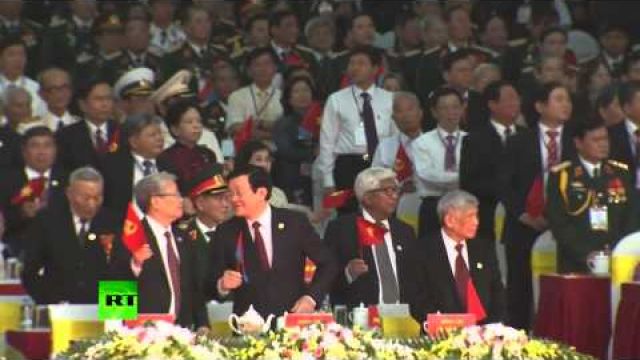Vietnam: 40th Anniversary Of The End Of The Vietnam War | The fall of Saigon
179 views
Uploaded by:
Vaughn Carey
•
Category:
General
•
Added on
01 May 2015
Description
Vietnam marks 40yrs since end of war with parade Apr 30, 2015 HO CHI MINH CITY, Vietnam. A parade commemorating the 40th anniversary of the end of the Vietnam was held in Ho Chi Minh City. Tuesday marked 40 years since the Communist north seized the city, once the South Vietnam capital known as...
Vietnam marks 40yrs since end of war with parade Apr 30, 2015 HO CHI MINH CITY, Vietnam. A parade commemorating the 40th anniversary of the end of the Vietnam was held in Ho Chi Minh City. Tuesday marked 40 years since the Communist north seized the city, once the South Vietnam capital known as Saigon, to reunify the country. On April 30, 1975, North Vietnamese tanks rolled through the gates of the Presidential Palace, the heart of the US-backed Saigon government. The fall of Saigon was the the official end to the Vietnam War and the US's decade-long involvement in southeast Asia. *** Read More: Fall of Saigon Date: April 30, 1975 Location: Saigon, South Vietnam Result: Decisive North Vietnamese victory • End of the Vietnam War • Provisional government established; Viet Cong gains nominal authority in South Vietnam • Mass exodus of refugees • Eventual reunification of Vietnam into a communist state The Fall of Saigon was the capture of Saigon, the capital of South Vietnam, by the People’s Army of Vietnam and the National Liberation Front of South Vietnam (also known as the Việt Cộng) on April 30, 1975. The event marked the end of the Vietnam War and the start of a transition period to the formal reunification of Vietnam into a socialist republic, governed by the Communist Party of Vietnam. North Vietnamese forces, under the command of the General Văn Tiến Dũng, began their final attack on Saigon, with South Vietnamese forces commanded by General Nguyễn Văn Toàn, on April 29, suffering heavy artillery bombardment. This bombardment at the Tân Sơn Nhứt Airport killed the last two American servicemen to die in Vietnam, Charles McMahon and Darwin Judge. By the afternoon of the next day, North Vietnamese troops had occupied the important points of the city and raised their flag over the South Vietnamese presidential palace. The South Vietnamese government capitulated shortly afterward. The city was renamed Hồ Chí Minh City, after the Democratic Republic's President Hồ Chí Minh. The capture of the city was preceded by the evacuation of almost all the American civilian and military personnel in Saigon, along with tens of thousands of South Vietnamese civilians associated with the southern regime. The evacuation culminated in Operation Frequent Wind, the largest helicopter evacuation in history. In addition to the flight of refugees, the end of the war and institution of new rules by the communists contributed to a decline in the city’s population. **[VIDEO Credit: RT]
